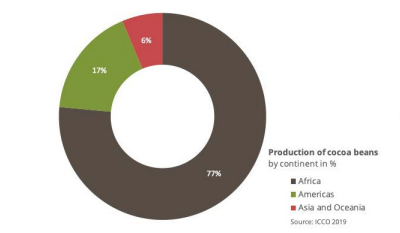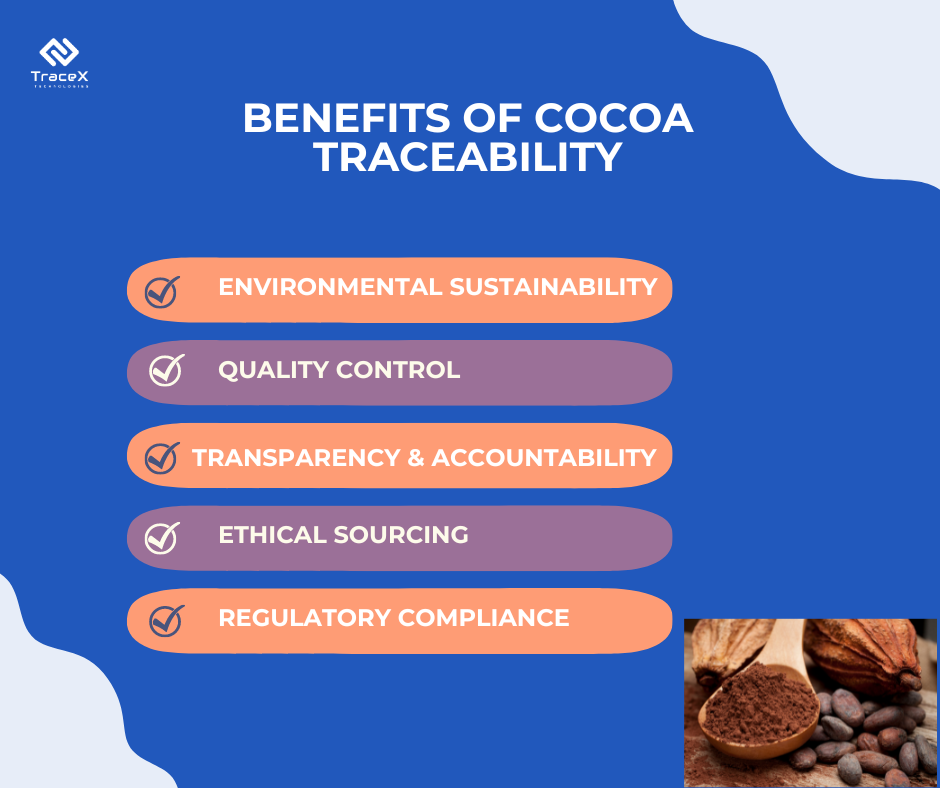Contact: +91 99725 24322 |
Menu
Menu
Quick summary: Explore the intricate web of cocoa traceability in Western and Central Africa. Delve into the challenges, initiatives, and technological solutions shaping the cocoa industry's sustainability. Uncover the journey from farm to consumer, ensuring transparency and ethical practices. Discover the pivotal role of traceability in promoting responsible sourcing and environmental conservation.

From the lush plantations to the chocolate bars on our shelves, discover the stories behind the cocoa beans and the cocoa traceability in Africa (Western and Central Africa). The crop is a primary source of income for smallholder farmers in Western and Central Africa, and the industry employs a significant portion of the population. As a major player in the global cocoa market, these countries are crucial suppliers of the raw material that brings us one of the world’s most beloved treats – chocolate.
Cocoa production holds an integral place in the economies of Western and Central Africa, contributing over 70% of global cocoa production (2021/22: 4.4 million tons) and also to the livelihoods of millions in the region.
In a region that plays a pivotal role in global cocoa cultivation, understanding the journey of cocoa from farm to market becomes essential. Join us as we explore the challenges, initiatives, and technological solutions aimed at tracing the origins of cocoa beans, ensuring transparency, ethical practices, and sustainability in an industry deeply woven into the fabric of these African landscapes.
Traceability is an important aspect in Cocoa supply chain that ensures transparency and accountability at every stage of production. The process involves meticulously tracking the journey of Cocoa beans from the farms where they are grown to final product on store shelf keeping a track of all the processes undergone. This not only aids in maintaining quality control but also addresses ethical concerns.
Cocoa traceability systems lay the groundwork for enhancing transparency throughout value chains and enable the establishment of monitoring systems. These systems grant access to crucial information, thereby enhancing the reliability of sustainability claims.


The current landscape of cocoa production involves several processes, from cultivation on farms to the final processing of cocoa beans into various cocoa-based products. Traceability is crucial at each step to ensure ethical practices, quality control, and environmental sustainability. Let’s delve into the processes involved and explore the importance of traceability in each step:
Major chocolate companies and traders wield significant influence in the cocoa industry. While they contribute to the economic vitality of the region, their dominance raises questions about the ethical sourcing of cocoa. Establishing robust traceability mechanisms becomes imperative to ensure that the supply chain is free from exploitation and follows ethical standards.
In 2019, the global sales of chocolate-based confectionery products reached an estimated 110 billion USD. Chocolate consumption witnessed a significant increase of 33% over a decade, compared to 2008/09, and this upward trend is projected to continue Côte d’Ivoire holds the position of the world’s largest cocoa producer, involving over one million smallholder farmers who contribute to an annual production of over 2 million tonnes of cocoa beans—constituting 40% of the global cocoa harvest. This cocoa trade constitutes more than one-third of Côte d’Ivoire’s total export revenue.
Deforestation in the Cocoa Value Chain.
Learn how this critical issue affects sustainability, traceability, and ethical sourcing.
Uncover the Hidden Impact
Côte d’Ivoire and Ghana have implemented traceability and forest monitoring systems, stemming from their prominent role in the Cocoa & Forests Initiative (CFI). This initiative is instrumental in advancing sustainable cocoa supply chains in West Africa, with national traceability standing out as a pivotal component in the action plans of both countries under CFI.
The Cocoa & Forests Initiative (CFI), facilitated by the World Cocoa Foundation and IDH, unites 35 cocoa companies in collaboration with the governments of Ghana and Côte d’Ivoire. CFI downstream companies track 82% (Ghana) and 74% (Côte d’Ivoire) of direct cocoa supply from farm to the first purchase point. In 2020, approximately 605,000 farms were mapped as part of the CFI initiative.
In June 2019, Côte d’Ivoire and Ghana jointly initiated efforts to increase the price paid to cocoa producers, responding to pressure from various stakeholders to address issues like deforestation, child labor, and producer living standards. This collaboration, known as the Côte d’Ivoire-Ghana Cocoa Initiative (CIGHCI), introduced the Living Income Differential (LID) premium scheme in 2020. The LID aimed to raise the international selling price of Ivorian and Ghanaian cocoa by requiring buyers to pay an additional premium of USD 400/t on top of the standard market price. Furthermore, the two countries advocated for the development of the ‘ARS 1000 African Standard for a Sustainable and Traceable Cocoa,’ published by the African Organization for Standardization (ARSO).
The EUDR establishes a compulsory due diligence system for EU operators and large traders, ensuring their products are free from deforestation and comply with relevant local legislation in the production country. It introduces a country benchmarking system to assess compliance risks in producer nations. The UK Environment Act sets a legality standard for Forest Risk Commodities in the UK, emphasizing adherence to local laws on land use and rights. Both regulations will impact Africa’s cocoa industry, heavily reliant on EU and UK markets. To sustain access, operators and traders must address deforestation and child labor. For Africa, this presents an opportunity to reform its cocoa sector, addressing environmental, price, and child labor concerns.
One of the primary challenges in cocoa traceability is the lack of transparency in the supply chain. This opacity often leads to unethically sourced cocoa, involving practices like child labor and contributing to environmental degradation. The absence of effective accountability mechanisms exacerbates the difficulty in addressing these issues.
Many cocoa farmers are smallholders with limited resources and technology access. Implementing traceability on small, dispersed farms can be logistically challenging.
Cocoa production is frequently associated with deforestation, as farmers expand their fields into natural habitats. Moreover, concerns regarding fair wages, child labor, and unsafe working conditions persist. These social and environmental challenges underscore the urgent need for a comprehensive traceability system.
Lack of standardization and interoperability among different traceability systems can create inefficiencies and gaps in the overall traceability process.
Meeting evolving regulatory standards, such as the European Union’s due diligence regulations, requires continuous adaptation and may pose challenges for some stakeholders.
Limited awareness among consumers about the importance of traceability may reduce the pressure on the industry to invest in robust traceability measures.

TraceX’s blockchain traceability solutions play a pivotal role in overcoming the challenges of cocoa traceability. By leveraging blockchain technology, TraceX ensures transparency and accuracy in the cocoa supply chain. The decentralized nature of blockchain allows for secure and tamper-resistant recording of each transaction, addressing concerns related to data accuracy. For smallholder farmers, TraceX provides user-friendly tools and interfaces, making it easier to participate in traceability initiatives. The interoperability of TraceX’s blockchain system facilitates seamless integration with diverse technologies, fostering standardization. The system also aligns with evolving regulatory requirements, ensuring compliance with initiatives like the European Union’s due diligence regulations. Additionally, TraceX creates incentives for industry participants by enhancing their visibility and credibility, aligning with consumer demand for ethically sourced and traceable cocoa products. Through these features, TraceX contributes to building a more transparent, efficient, and sustainable cocoa supply chain. Farm-level traceability provided by TraceX ensures transparency and accountability in the sourcing process, helping companies adhere to sustainability goals and mitigate environmental impacts associated with deforestation.
The pursuit of enhanced cocoa traceability in Western and Central Africa represents a critical and transformative journey for the cocoa industry. The multifaceted challenges faced by these regions, from ethical concerns to environmental sustainability, underscore the urgency of implementing robust traceability measures. The concerted efforts to improve cocoa traceability are not merely a response to market demands but a fundamental commitment to fostering a sustainable, ethical, and resilient cocoa supply chain.
The current landscape of cocoa production in these regions reflects a mix of traditional farming practices, economic dependencies, and a pressing need for innovation. The role of key players, including chocolate companies, traders, and regulatory bodies, becomes pivotal in steering the industry towards sustainable practices. The adoption of advanced technologies, such as blockchain and mobile applications, is poised to revolutionize traceability, offering real-time insights into the journey of cocoa from farm to consumer.
Looking towards the future, emerging trends in cocoa traceability, including blockchain, geospatial technology, and the Internet of Things, promise to elevate the precision and effectiveness of traceability systems. Anticipated developments in sustainable cocoa production, such as agroforestry practices, climate-smart agriculture, and supply chain collaboration, signal a shift towards holistic and regenerative approaches.
